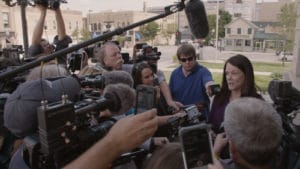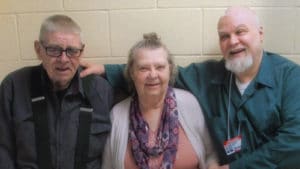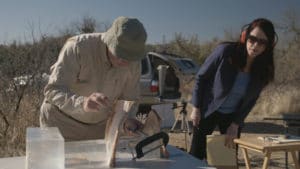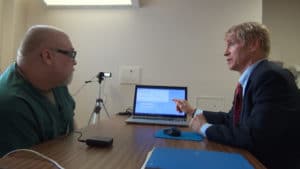“Don’t let Netflix tell you what to think.” De Netflix documentaire Making a Murderer zorgde in 2016 voor enorme ophef in de Verenigde Staten en de rest van de wereld. De samenleving was verdeeld in twee kampen: degene die geloofden dat Steven Avery schuldig was en de mensen die van mening waren dat hij wederom onschuldig in de cel zat. Tweestrijd. Net als een paar weken geleden in de zaak rondom de nominatie van Brett Kavenaugh als rechter voor het Hooggerechtshof. Dit resulteerde in het geval van Avery in petities en demonstraties, maar ook in doodsbedreigingen aan het adres van onder andere de sheriff en aanklager. Nu komt Netflix op 19 oktober met een tweede seizoen; Making a Murderer: Part Two. Ik kreeg de kans om alvast een aantal afleveringen van het nieuwe seizoen te bekijken.
Is Steven Avery er wederom ingeluisd door politie en justitie? De makers van Making a Murderer doet er alles aan om de kijker hiervan te overtuigen en presenteren een geloofwaardig verhaal. Waar men normaal gesproken onschuldig is totdat het tegendeel is bewezen, lijkt het in Avery’s geval andersom te zijn.
Macht van de media
Voor Making a Murderer zijn media een goed pressiemiddel geworden voor de teams die proberen om zowel Steven Avery als Brendan Dassey vrij te krijgen. Bovendien leggen ze de fouten van politie en justitie bloot; degene die besluiten over iemand zijn of haar vrijheid, en, in extreme gevallen, over leven en dood. Voor Kathleen Zellner, Steven Avery’s advocate, is het favoriete medium om het publiek te wijzen op de fouten van politie en justitie zo te zien: Twitter.

Het gevecht tegen het justitiële apparaat
De eerste afleveringen van tweede seizoen besteden meer aandacht Brendan Dassey; als zoon en broer, als persoon. Ook krijgen we inzicht in de situatie rondom de gedwongen bekentenis en hoe zijn huidige— ‘postconviction’— advocaten vechten voor het ongedaan maken van Brendan’s veroordeling. Na verschillende schijven in het Amerikaanse rechtssysteem te hebben doorlopen, is er licht zichtbaar aan het einde van de tunnel. Federale rechter Duffin geeft toe dat de veroordeling op basis van de bekentenis niet geldig is. Echter, openbare aanklager Brad Schimel dient namens de staat een beroepschrift in tegen dit besluit. Uiteraard, want de beslissing heeft verre gevolgen voor de zaak en veroordeling van Steven Avery, wiens zaak is gebaseerd op Brendan’s bekentenis. Een keer onschuldig in de cel door corruptie is een blamage, maar een tweede keer is natuurlijk desastreus.

There is no business like show business
Zoals al te zien was in het eerste deel, de media hebben enorme impact gehad op de perceptie en het verloop van de levens van Avery en Dassey. Ook in het tweede seizoen wordt dit element belicht. Niet alleen het justitiële gedeelte, maar ook het persoonlijke aspect. Waar camera’s zijn, komen ook mensen die graag hun ‘fifteen minutes of fame’ willen. Bij een sensationele zaak als deze komt het voor dat personen naar voren komen die beweren ergens getuige van te zijn geweest of bekentenissen doen die niet op waarheid berusten.

Daarnaast heb je (vooral) vrouwen die Making a Murderer hebben gevolgd en interesse hebben in een relatie met Brendan of Steven. Het perfecte onderwerp voor (tv) psychiater Dr. Phil. Brendans verloofde, Sandra Greenman, dumpte hem om religieuze redenen toen ze bij Dr. Phil te gast was. In seizoen twee is te zien dat ze nog erg close zijn. Zijn relatie en verloving met Lynn Hartman werd eerst geheim gehouden om (online) bedreigingen te voorkomen. De ironie: Lynn is getrouwd geweest met een politieagent. Tijdens de show van Dr. Phil was ze verliefd en overtuigd van zijn onschuld. Echter, een update van een jaar later beweert ze het tegenovergestelde. Ze ontving, volgens haar, nietsverhullende, expliciete bedreigende brieven van Avery. Hij beweert haar te hebben gedumpt omdat ze een ‘gold digger’ is. Dat ze een relatie met hem was aangegaan om publiciteit en geld. Dit allemaal draagt natuurlijk bij aan de perceptie van schuld of onschuld.

Wat is de waarheid
In de eerste aflevering maakt een betrokkene de opmerking “No faith in the system” te hebben en dit lijkt een correcte bewering te zijn. Dit wordt bevestigd als Kathleen Zellner tijdens haar onderzoek van de bewijzen zegt: “They are going to regret the day they planted that evidence.” Als kijker word je het verhaal ingezogen; de deconstructie van de zaak en geleverde bewijzen door diverse experts roepen een primair gevoel van verontwaardiging en onrecht op. Wat is de waarheid? Het definitieve antwoord op die vraag laat waarschijnlijk nog even op zich wachten. Als hij ooit komt. Tot die tijd assisteren Netflix en de andere media het publiek wel bij het vormen van een bepaald beeld.

Vanaf 19 oktober zijn de 10 afleveringen van het tweede seizoen van Making a Murderer te zien op Netflix.
